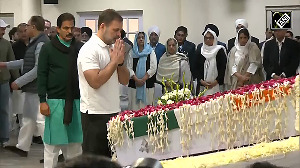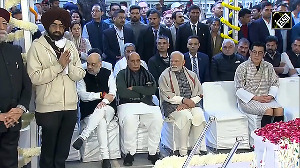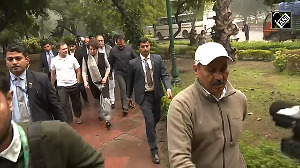A group of non-proliferation activists were putting pressure on lawmakers to tighten their grip over India ahead of the Senate debate on civilian nuclear deal, asking them to ensure that New Delhi will not pursue nuclear weapons programme once the agreement get through.
In a letter to Senators titled 'Fix the Nuclear Cooperation Deal with India', 16 activists have called upon lawmakers to find remedy for "serious flaws" in the bill pertaining to the agreement and urged them to strive to "further offset" the adverse effects of the arrangement on US non-proliferation and security objectives.
They have recommended the addition of a determination that the US would not in any way assist or encourage India's weapons programme and that prohibit the US government from continuing nuclear assistance or facilitating foreign nuclear exports to India if India breaks existing non-proliferation commitments and practices.
The signatories include Darryl Kimbal of the Arms Control Association, Joseph Cirincione of the Center for American Progress, Ralph Earle former director of the Arms Control and Disarmament Agency, Professor Frank Von Hippel of Princeton University and John Holum, former under secretary of state for Arms Control and International Security Affairs.
"We believe these measures are necessary because India has neither joined the nuclear non-proliferation treaty nor accepted safeguards on all of its nuclear facilities, and India's non-proliferation policy is not fully consistent with the non-proliferation practices and responsibilities expected of the original nuclear-weapon states " they said.
The activists have also recommend that members of the Congress should restrict full nuclear trade until India joins the original nuclear-weapon states in stopping the production of fissile material for weapons or subscribes to a multilateral fissile production cutoff agreement.
The administration should ensure that it will not provide nuclear assistance directly or through other suppliers in the event that India breaks the non-proliferation commitments outlined in the July 18, 2005, agreement and a determination that Indian government or affiliated entities were not engaged in illicit procurement of weapons of mass destruction-related items.
"To help ensure that civilian nuclear cooperation is not in any way advancing India's weapons programme and is not contributing to nuclear arms competition with Pakistan and China, Congress should require that the president determines that India has stopped fissile material production for weapons or has joined a multilateral production ban before the United States resumes full civil nuclear assistance to India," they said in the letter.
"If India is truly committed to a minimal credible deterrent, India should be able to declare as a matter of national policy that it has stopped fissile material production for weapons, or else join the United States, China, France, Pakistan, Russia and the United Kingdom in a multilateral fissile cutoff agreement, pending the completion of a global, verifiable FMCT.
The Congress should direct the US president to actively pursue the early conclusion of such an interim cutoff agreement with India and other relevant parties, pending the entry into force of a global FMCT," the letter said.
They said New Delhi's commitment to support American efforts to negotiate a global fissile material cutoff treaty is "laudable" but a "hollow" promise.
"S 3709 now makes clear that US nuclear assistance would be jeopardised if India conducts a nuclear test explosion or commits some other transgression of its commitments on the July 18 Bush-Dr Singh joint statement. The bill also states that it is US policy not to facilitate nuclear trade by other nations with India if US exports are terminated," the authors said.
"However, India is insisting that the United States help provide an assured nuclear fuel supply, even in the event that the New Delhi government conducts a nuclear test explosion or otherwise violates its non-proliferation commitments. Such a guarantee would be unprecedented and unwise," they said.
Congress should further clarify that with respect to India, it is US policy to provide a supply of nuclear fuel only on an as needed basis and only if India continues to meets the commitments it made in the July 18, 2005 joint statement and other provisions in US law, the authors of the letter said.
The non-proliferation specialists have also urged Congress to retain several important elements already in S 3709 which in their view would help reduce the adverse impacts of the initiative.
"Among these are the provisions requiring that a new safeguards agreement between the IAEA (International Atomic Energy Agency) and India has entered into force and that such safeguards are consistent with IAEA standards, principles, and practices, and that such safeguards are permanent before any expanded nuclear cooperation can take place," they said.
"With respect to the Section 106 provision restricting the transfer of enrichment and reprocessing technologies, for 30 years US non-proliferation policy has sought to discourage the spread of sensitive nuclear technology. As President Bush said in February 2004, enrichment and reprocessing are not necessary for nations seeking to harness nuclear energy for peaceful purposes," they said.
Current US nuclear cooperation agreements, including those with EURATOM, Japan, and China, expressly prohibit transfers of such technologies, which can be used to make nuclear bomb material.
India should not in any way be an exception to that important policy, they told lawmakers.
Kimball told AFP that "in our view these are responsible actions and steps the Congress should take to ensure that the deal does not create what we would consider to be adverse and damaging proliferation problems."






 © 2024 Rediff.com -
© 2024 Rediff.com -